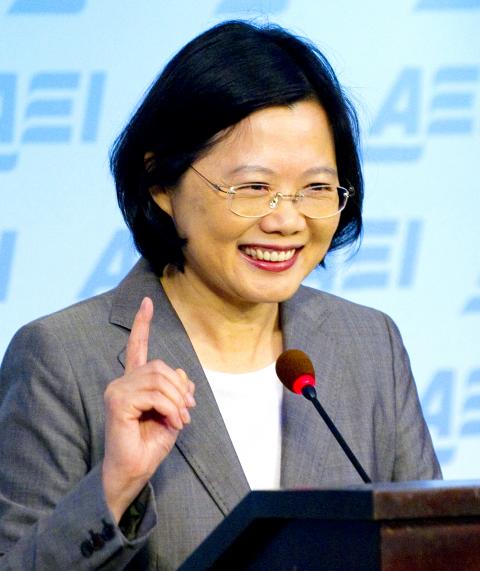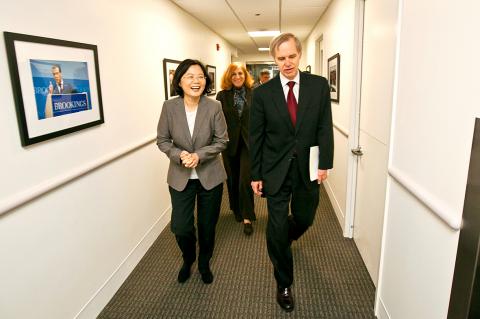Democratic Progressive Party (DPP) Chairperson Tsai Ing-wen (蔡英文) has pledged to rebuild confidence and reinforce the strategic partnership between the DPP and the US.
In a wide-ranging speech delivered to the conservative American Enterprise Institute in Washington, presidential candidate Tsai said that DPP members “cherish” Taiwan’s relationship with the US and that it was at the top of her agenda to renew and improve it.
Tsai is on a nine-day tour of the US aimed at least in part at reassuring the administration of US President Barack Obama that if elected the DPP would strive to maintain cross-strait peace and stability.

Photo: AFP
“We acknowledge that toward the end of the previous DPP administration there were diverging views on strategic priorities and our relationship went through a rough period,” Tsai said.
Tsai was scheduled to meet administration officials in -Washington yesterday, including US Assistant Secretary of State for East Asia Kurt Campbell.
Her highly anticipated speech — delivered to a packed audience that included former World Bank president Paul Wolfowitz — contained the same message that she is delivering in private to the US government.

Photo: CNA
“Anyone who governs Taiwan must have an accurate understanding of the practical realities as well as the wishes of the Taiwanese people and major policy must be formulated through democratic procedures,” she said. “I have raised the concept of a ‘Taiwan consensus,’ which highlights the democratic process of decision-making and emphasizes the fact that policy is only sustainable when it is a realistic response to the consensus and needs of the people.”
“Any political precondition that is not democratically agreed upon is fragile at most and will not withstand the test of time,” she said.
In answer to a question from the audience, she said there were some current political positions that might be too fragile for future negotiations. These positions did not amount to a “solid foundation” upon which China and Taiwan could build a long-term “broad coverage” relationship, she said.
“We have to get together and get a ‘Taiwan consensus,’ before we go to China to discuss and negotiate a basis to build our future relationship,” she said.
Tsai said the DPP’s approach toward China would be “stable and balanced” and in line with the “mainstream consensus” and -international expectations.
“We will refrain from extreme or radical approaches,” she said. “The current stalemate across the Strait is a product of the evolution of history, but the future of relations does not have to be a zero-sum situation and we are willing to take a strategic approach that benefits the people of both sides.”
“We acknowledge that Beijing insists on the ‘one China’ principle as its fundamental position toward Taiwan,” Tsai said.
“However, Beijing must also understand the reality that the Taiwanese people, having gone through the historical processes of freeing themselves from foreign rule and seeking democratization, are opposed to a one-party system and committed to upholding the independence of their sovereignty,” she said.
She said that the DPP had no “fundamental animosity” toward the people of China and that it was willing to play a proactive and constructive role in “the development of a vibrant civil society and market economy in China.”
Tsai said that the US was Taiwan’s most important and reliable partner in international relations.
“The friendship extends deep into the emotional sentiments of the Taiwanese people who value the multiple dimensions of trade, cultural, educational and historical interactions that we have had,” she said.
Tsai said that it was a party priority to maintain the strategic balance across the Taiwan Strait and that it would involve the Taiwan military receiving adequate support from the US “to defend ourselves.”
She said that while peace and development appear to be the common lingo across the Taiwan Strait, peace must be backed by a commitment to security.
“Despite the conciliatory attitude of our current government toward China, the military buildup across the Strait has not ceased,” Tsai said. “Recent developments of the PLA [People’s Liberation Army] in advanced weapons systems and naval capabilities have tipped the balance in China’s favor, and Taiwan’s ability to deter and defend against the use of force will no longer be credible unless we demonstrate our commitment to investing in Taiwan’s self defense.”
“We would welcome a decision by the US to provide Taiwan with advanced defense systems that are deemed necessary through a process of mutual consultation between our militaries and defense experts,” she said. “The DPP, and in particular our legislative caucus, has expressed disappointment in the [President] Ma [Ying-jeou (馬英九)] administration’s lack of dedication to a strong defense in the apparent declining budget proposals submitted. The situation must be rectified by a stronger demonstrated commitment.”
Both the US and Taiwan, she said, faced the issue of a more aggressive Chinese military with “core interest” claims that threatened the freedom of navigation and regional stability, but that the US and Taiwanese relationships with China were “fundamentally different” in nature and “some of our policy responses may not be entirely the same.”
“That is why it is absolutely important that we constantly communicate our objectives and our strategies, to ensure a norm of predictability and consistency,” she said. “At the moment, most Taiwanese seem to accept the ‘status quo’ where Taiwan is by all practical definitions already an independent country, and although people are frustrated by international discrimination, the desire to maintain political separation from China is commonly apparent.”

CROSS-STRAIT COLLABORATION: The new KMT chairwoman expressed interest in meeting the Chinese president from the start, but she’ll have to pay to get in Beijing allegedly agreed to let Chinese Nationalist Party (KMT) Chairwoman Cheng Li-wun (鄭麗文) meet with Chinese President Xi Jinping (習近平) around the Lunar New Year holiday next year on three conditions, including that the KMT block Taiwan’s arms purchases, a source said yesterday. Cheng has expressed interest in meeting Xi since she won the KMT’s chairmanship election in October. A source, speaking on condition of anonymity, said a consensus on a meeting was allegedly reached after two KMT vice chairmen visited China’s Taiwan Affairs Office Director Song Tao (宋濤) in China last month. Beijing allegedly gave the KMT three conditions it had to

‘BALANCE OF POWER’: Hegseth said that the US did not want to ‘strangle’ China, but to ensure that none of Washington’s allies would be vulnerable to military aggression Washington has no intention of changing the “status quo” in the Taiwan Strait, US Secretary of Defense Pete Hegseth said on Saturday, adding that one of the US military’s main priorities is to deter China “through strength, not through confrontation.” Speaking at the annual Reagan National Defense Forum in Simi Valley, California, Hegseth outlined the US Department of Defense’s priorities under US President Donald Trump. “First, defending the US homeland and our hemisphere. Second, deterring China through strength, not confrontation. Third, increased burden sharing for us, allies and partners. And fourth, supercharging the US defense industrial base,” he said. US-China relations under

The Chien Feng IV (勁蜂, Mighty Hornet) loitering munition is on track to enter flight tests next month in connection with potential adoption by Taiwanese and US armed forces, a government source said yesterday. The kamikaze drone, which boasts a range of 1,000km, debuted at the Taipei Aerospace and Defense Technology Exhibition in September, the official said on condition of anonymity. The Chungshan Institute of Science and Technology and US-based Kratos Defense jointly developed the platform by leveraging the engine and airframe of the latter’s MQM-178 Firejet target drone, they said. The uncrewed aerial vehicle is designed to utilize an artificial intelligence computer

The Chinese Nationalist Party (KMT) caucus yesterday decided to shelve proposed legislation that would give elected officials full control over their stipends, saying it would wait for a consensus to be reached before acting. KMT Legislator Chen Yu-jen (陳玉珍) last week proposed amendments to the Organic Act of the Legislative Yuan (立法院組織法) and the Regulations on Allowances for Elected Representatives and Subsidies for Village Chiefs (地方民意代表費用支給及村里長事務補助費補助條例), which would give legislators and councilors the freedom to use their allowances without providing invoices for reimbursement. The proposal immediately drew criticism, amid reports that several legislators face possible charges of embezzling fees intended to pay